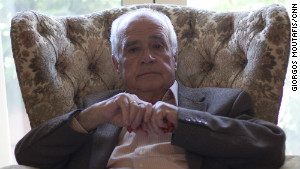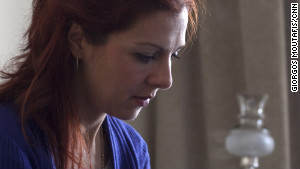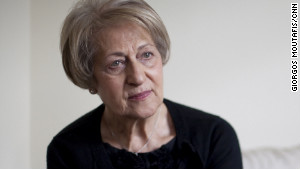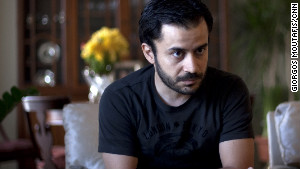Aigio (CNN) -- The bank where she died in Athens is
still shrouded in green tarpaulin and boarded off with corrugated iron.
Graffiti scrawled in black across the front reads: "Traitors" and
"killers."




This is where Angeliki
Papathanasopoulou worked 12-hour days as a financial analyst at Marfin
Egnatia Bank, working not only for the benefit of her family but also
with a desire to contribute to the country she loved.
The site -- in the center
of Athens, just minutes from Syntagma Square and in a commercial hub of
the city -- is one door down from the historic Attikon Cinema, one of
dozens of buildings torched during the city's explosive protests of
February this year.
Now, two years since Greece took its first bail-out and Angeliki died, the country is going to the polls. The election is expected to produce the most fractured result in decades.
My sister is around me all the time. I think about her every minute
of the day. She is beside me and next to me, her spirit is around me.
Sissy Papathanasopoulou, sister
Sissy Papathanasopoulou, sister
At 8am on May 5, 2010,
Angeliki's husband Christos dropped her at the bank, on Stadiou Street.
The couple lived just five kilometers away, in Vyronas, in the small
apartment they had purchased a couple of years earlier.
Around 11am, Angeliki
chatted on the phone with her mother Tota, then her older sister Sissy
an hour later. Sissy was due to drive from her home in Patras to Athens
that afternoon, before flying to meet her husband in Milan. The sisters
discussed where they might eat together that evening. By then, Angeliki
would have exciting news to share.
Four months pregnant with
their first child, Angeliki and Christos were scheduled to learn the
sex of their baby at an appointment that afternoon.
The plan was for Christos
to pick her up at 3pm for the 4pm appointment, then they would see
Sissy later. But, around 2pm, Christos took a call from his 32-year-old
wife.
The bank was on fire.
A promising life remembered
Two years later, at the family home, an inches-deep pile of photographs frames the country's tragedy through a personal lens:

Angeliki as a baby,
holding herself up by the tapestry chair where her father now sits to
remember her; leaping across the stage in a white tutu during a ballet
production as a young girl; sporting a Jackie O-esque hair-style in a
photograph her father raises to his face to kiss.
Angeliki is with us all the time.
Haris Papathanasopoulos, father
Haris Papathanasopoulos, father
The family has gathered
in Aigio, two and a half hours by road from Athens, up a coastline
flanked by the Ionian Sea and scattered with olive groves, lemon and
orange trees.
On the dining table are delicate yellow freesias, brightening a room which is dense with love, and loss.
Sissy, who comes to the door with a wide smile, has made the short drive from Patras with her husband, Nikos Vasileiou.
Angeliki's mother, Tota,
elegant in black with a simple silver cross around her neck, enters the
living room carrying home-made yogurt cake, followed by braided
koulourakia [Greek biscuits] and black coffee. The patriarch of this
proud family, Haris, a retired lawyer, enters a few minutes later.
They greet Angeliki's
husband, Christos Karapanagiotis, who has driven from Athens where he
works for a shipping company, with kisses.
It is hard not to look
at him without also glancing at the photograph of Angeliki on their
wedding day in Loggos, the day she told her mother, "I feel like a
princess," like "the center of the world."
The family recalls
childhood summers, when the sisters spent the hot months of June to
September with their cousins, Zeti and Angelina, at the family's
beach-house in Loggos. "We would play grown-ups... from morning to
midday, afterwards we were swimming and in the afternoon we would play
in the mud," says Sissy, who is now a lawyer. "That was the program."

The sisters were close,
exchanging letters and cards weekly and talking daily after Sissy moved
to Athens to study. When Angeliki turned 18, they traveled to Paris
together and spent 15 "perfect, perfect" days, says Sissy.
We were the closest friends.
Sissy Papathanasopoulou, sister
Sissy Papathanasopoulou, sister
In Paris, they practiced
their French, fell in love with the ancient Greek statue of Aphrodite
of Milos at the Louvre, and bought posters of Monet and Manet to
decorate their flat in the Exarcheia area of Athens. When the sisters
were in their teens and their early 20s, the family traveled together to
Italy, Austria and Switzerland.
"We were the closest
friends. I knew everything about her and she knew everything about me,"
says Sissy. They would cover for each other when their parents called.
"I was going out late, they would call and she would say 'no she can't
[talk] she is sleeping'."
Angeliki grew up to be a
sophisticated, erudite and witty woman who excelled in mathematics. She
studied actuarial science at Cass Business School in London before
returning to Athens in mid-2004, when the country was flush with the
glory of the Olympic Games.
"That was a very, very
good period for Greece," Christos says. "We wanted to come back. If you
have a good job [in Greece], you can have a very good life. And we had
the view that it was better to spend your efforts for Greece -- we
wanted to spend our efforts for Greece."
Of his wife, Christos
says: "It is difficult to find people who are so intelligent and
well-balanced at the same time." With a quiet smile he adds, "Einstein
was a genius but he was a genius in mathematics. Angeliki was not only a
genius in mathematics -- she was a genius in everything. That is
something you don't find easily in real life."

Christos and Angeliki both grew up in close families, and holidays were often spent with relatives.
She was a very sweet child.
Tota Papathanasopoulou, mother
Tota Papathanasopoulou, mother
Sissy saw Angeliki for
the last time during Easter, which coincides with Sissy's "name day" -- a
tradition to celebrate the provenance of one's name. Around 30 family
members had gathered in Loggos to feast on oven-baked lamb and salads
put together by Sissy and Angeliki. The sisters had both observed Lent
by declining meat for seven days. Angeliki retired early that day, as
her pregnancy was fatiguing. "She was sleeping all the time," says
Sissy. But her sister was "very happy."
Angeliki and Christos
were rooted. "We had no plans to leave," Christos says. "We are Greek
citizens, and we would like to support ...Greek society. This is a
beautiful country."
But by 2010, the country was in desperate financial trouble.
Rebellion sparks violence
On Sunday May 2, 2010,
the eurozone's finance ministers declared they would inject €110 billion
into Greece to save it from bankruptcy. Greece had finally capitulated
to the demands of its eurozone peers. "The alternative course would be a
catastrophe and greater pain for all," declared then-Prime Minister
George Papandreou.
The situation was threatening global stability. The bail-out was meant to save the hard-fought "European project,"
but it would leave the Greek people paying dearly for their boom times.
In return for the funds, the government agreed to cut and freeze
pension payments and public sector pay wages. Christmas, Easter and
summer bonuses were abolished and taxes were raised.
A nationwide strike was called for May 5.

Angeliki and Christos
were not worried. The streets were often rowdy with protests, but it was
directed at government, and attacks against people were rare. Angeliki
was in a "very big company," Christos says. "We thought it was safe,"
Sissy adds.
Angeliki was a genius in everything.
Christos Karapanagiotis, husband
Christos Karapanagiotis, husband
There had been dozens of
marches up Stadiou Street, Christos says. "Everybody had the feeling
[Angeliki] was working in a safe environment. You could never forecast
what might have happened."
Greece's history of
being ruled by others -- invaded by Italy in 1940 before being occupied
by Germany, then shredded by civil war, ruled by a military dictatorship
between 1967 and 1974 and now at the mercy of the European Troika of
financial masters -- has traditionally set its people against the state.
"What makes Greece
different from other European countries is that the state has always
been an alien," says journalist Pavlos Tsimas. "The average citizen who
pays taxes doesn't feel like they are doing good for society. They feel
like they are being robbed. [Because] it is not the state we ourselves
made out of our revolution.
"There is always ...this resistance. This gives any part of rebellion against the Greek state some kind of legitimacy."
But this time, violence would erupt against fellow Greeks.
Protests explode
Marfin Egnatia -- like most banks -- was a target for attacks.
At around 1:30pm on May
5, 2010, about 50 masked and gloved protesters -- one group among tens
of thousands of people who protested in Athens that day -- were charging
up Patission Street, recalls photographer Giorgos Moutafis. They turned
left into Stadiou Street, toward Angeliki's workplace. Moutafis swung
in behind them, snapping pictures until he felt it was too dangerous to
continue.
Moutafis recalls the
group -- who he says did not belong to any political movement --
bragging of 150 molotov cocktails, chanting "burn them, burn the rich."
When the group got to Marfin, other protesters begged them not to attack
the bank: "No, there are people in there." But they were ignored: "F**k
them, burn it, burn the rich," the cries continued. The windows were
smashed, gasoline splashed over the bank's floor and Molotov cocktails
lobbed in. The protests rolled on toward tear gas being exploded in
Syntagma Square.
Black smoke began
pouring out of the windows of Marfin Egnatia Bank. Angeliki and two
colleagues, Paraskeui Zoulia and Epameinondas Tsakalis, were killed by
the toxic fumes.
Court documents allege a
series of failings by a bank executive, the bank's external health and
safety consultant and two managers -- including asking staff to remain
inside and locking the main doors during the riots -- that contributed
to the tragedy.
The documents say the
staff were unable to access an emergency exit, with a door for disabled
people that could be used in an emergency blocked by the fire. Further,
they said the bank did not have a fire safety certificate, unbreakable
windows, or security shutters drawn in readiness for the riots.
The bank rejects these
allegations. Thirteen days after the fire, the then non-executive
chairman of Marfin Popular Bank Group, Andreas Vgenopoulos, released a
letter to staff denying liability. In it, he said the bank had all the
statutory measures in place, including reinforced glass and an emergency
exit.
What makes Greece different from other European countries is that the state has always been an alien
Pavlos Tsimas, journalist
Pavlos Tsimas, journalist
It said the staff were
not pressured to work or prevented from leaving, but had decided to stay
inside for safety reasons. It also said the bank cooperated with
external consultants, who reported to them every month and had not noted
a problem. The letter said the attack was "murderous" and "wouldn't
stop unless there were dead people."
A representative for
Marfin said the bank maintains that position. He said the bank was in
compliance with all statutory requirements, including those for
emergency exits, and that there had been no request for staff to lock
the doors. The representative also said the bank did not require a fire
safety certificate, due to it being built before 1989.
Further, he said, the
bank was confident the courts would rule in favor of the executives and
there was "surprise" those who caused the incident remained free.
Within the labyrinthine interiors of the Athens courts, investigations into Marfin Egnatia Bank case inch along.
On June 18 the four employees will go to trial in Athens, accused of causing the three deaths by neglecting safety duties.
If convicted, the
executives each face a sentence of three months to five years, which can
be suspended, for each death. They also face charges in connection with
the injuries of 21 people.
Up to five protesters
are also being investigated for the fire-bombing of Ianos, the bookstore
opposite Marfin Egnatia Bank. The inquiry remains in the preliminary
stages but investigators suspect this group may also have been involved
in the attack on Marfin Egnatia Bank.
Greece fractured
Angeliki was sacrificed for a good future. But the better future never came.
Pepi Spiliotopoulou, Filodimos newspaper
Pepi Spiliotopoulou, Filodimos newspaper
Today, Greece's social
and political landscape is splintered, with support for the old guard of
New Democracy and PASOK plummeting as parties on the edges attract
votes from the disenchanted.
Last month, after Greece had been forced into taking its second bailout, 77-year-old retired pharmacist Dimitris Christoulas killed himself in Syntagma Square, leaving a suicide note citing pain from the austerity measures.
Tsimas believes the
election will be decided by one of two sentiments: Anger and fear. The
former will vote for the fringe parties, the latter the establishment.
Either way, the Greek
people face a fifth year of recession, and the country remains at risk
of being expelled from the eurozone.
"The numbers of really
poor people has doubled," Tsimas says. "And the middle classes, who
established themselves in the 80s, have lost their sense of security.
They have the fright of the fall that could come every other day. "
Further, he said, "there are millions in the public sector who feel
betrayed."
Pepi Spiliotopoulou is
owner and editor of newspaper Filodimos and Radio Egio, and went to the
same school as the Papathanasopoulou sisters. Since the crisis hit, she
has watched Aigio diaspora return, seeking solace in family plots which
can produce the food they can no longer afford to buy.
But the country's
struggles continue. Yorgos Avgeropoulos, of documentary production house
Small Planet, says the greatest fear now is of "social explosion. You
cannot stop hungry people entering, breaking into a supermarket. Right
now if the police tear gas [people] they run. But in one moment they
will stay because they have nothing to lose."
Says Pepi: "Angeliki was sacrificed for a good future. But the better future never came."
The Papathanasopoulou
family do not know who was guilty of throwing the firebombs. But
Christos questions a system that -- two years later, as buildings are
again being torched -- is unable to assuage the country's pain. "We ask
why. Who is responsible for that? Someone must be responsible for that.
Some families have been destroyed. This is still recurring."
In Aigio, Angeliki's
close family will gather to mark the second anniversary of her death by
attending church and placing flowers at her grave.
For Sissy, Angeliki has
never left. "My sister is around me all the time," she says. "I think
about her every minute of the day. She is beside me and next to me, her
spirit is around me. This is the way I see it, and the way I want to see
it."
ΠΗΓΗ: cnn.com
Δεν υπάρχουν σχόλια:
Δημοσίευση σχολίου